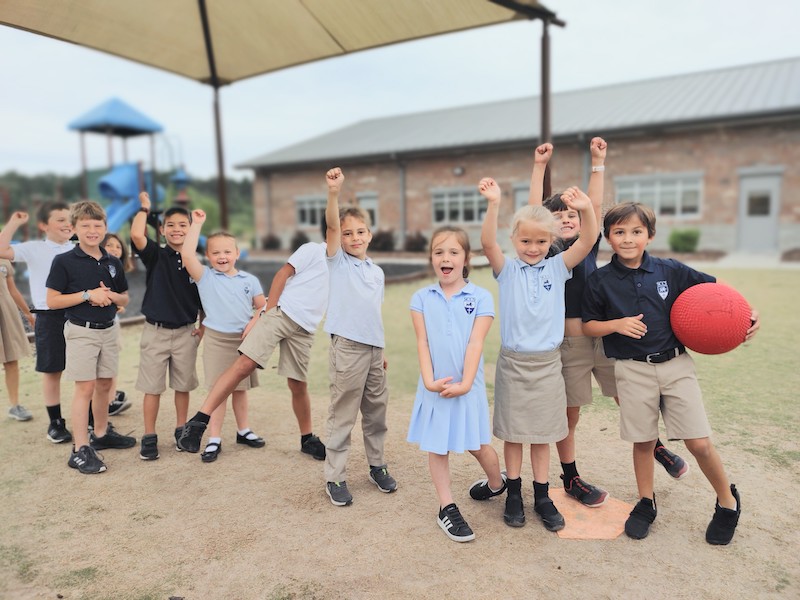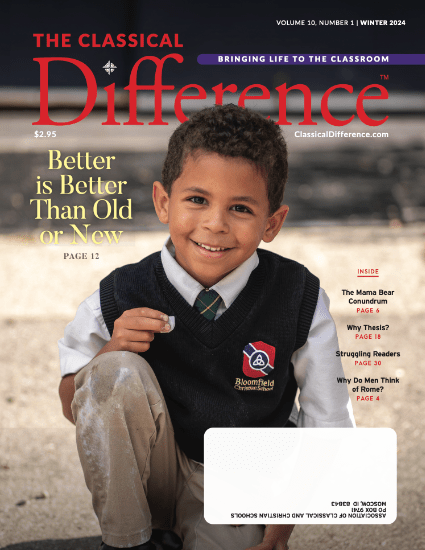By David Goodwin
Recently, looking back through some old files, I found an article from the inaugural issue of The Classical Difference.
————————————
“That your field?” a stranger asks.
You look at your five-acre dirt lot. “Yeah, did somebody get hurt on it?”
“No, I want to buy it. What do you want for it?” he says eagerly.
“It’s not for sale.”
“I’ll give you twice its appraised value,” comes his reply.
You search the internet, call the county, call a realtor, and no one can figure out why this guy would pay that much. So you walk out into the middle of the dirt field and you look around. All you can see is an old rusty toy wagon your son left out.
Do you ever wonder about those moments—and those years—before the pearl merchant noticed the pearl of great price, or the man who offered to buy the field found the treasure? Jesus tells these parables in Matthew as a description of the Kingdom of God. I can’t help but wonder at the story. Not the part about the treasure, per se. But rather because for years—maybe centuries—it was just a field with a hidden story underneath. Everybody just walked on by.
When I first met the families who started the classical Christian school in our area, I saw a field. It was a nice field—er, school. The kids wore uniforms, and they could really get going on those Latin chants. “This is just what our town needs,” I thought to myself, “a good school where kids are prepared for college and life.”
Over the next 20 years, the hidden treasure became more visible. And, I quit my job and did whatever it took to make sure my kids got the treasure that was under that field. I know dozens of families who have made even greater sacrifices.
My aspiration for the Association of Classical Christian Schools is to join with you, the parents, teachers, administrators, and friends of classical education, and buy the field. In my ten years as headmaster of a classical Christian school, I realized two things about many parents at our school. First, they did not fully appreciate what was happening to their son or daughter as we educated them—I’m not sure I did either. And secondly, classical Christian education looks so unique that many parents may wonder, “Maybe this is just weird, not special. Maybe we should go to the normal school down the street.” I felt the call to unite families so that they realize “We’re not crazy … there are thousands of other students in schools like this around the country.” And, as I travel the country to meet these students, I find that classical Christian students are exceptional.
————————————————————————
New Things Happening in the Field
Standing at the edge of the metaphorical field in 2023, our vision for the classical Christian harvest looks much the same. I’ve traveled more, and met more students—and I’m even more convinced that our students are exceptional. But there have been significant changes to our operations.
In the passing of the years since 2015, our number of students has grown from roughly 38,000 to 60,000+. The number of schools has increased from 234 to 475. Web traffic at ClassicalChristian.org has grown from around 500,000 unique individual visitors in 2017 (when we began more thorough tracking), to over 1.3 million in 2022. The Classical Difference (this magazine) grew from 6000 to over 20,000 print subscribers, and from 20,400 to over 113,000 individual website visitors at ClassicalDifference.com every year. The Good Soil study conducted by Notre Dame produced amazing statistics about the academic richness and quality of life of classical Christian alumni compared to other graduates. Stories continue to pour in from families whose lives have been changed by a new view of education. The movement has picked up steam. Whole businesses have grown up to provide curriculum, training, and events. There has even been a New York Times #1 Bestseller on the subject of not only education—a topic that has never been a best seller—but specifically classical Christian education.
————————————————————————
But as with all fields, without careful care and vigilance, even the best can be struck by fire or become overgrown and entangled.
“The task of all Christian scholarship—not just biblical studies—is to study reality as a manifestation of God’s glory, to speak and write about it with accuracy, and to savor the beauty of God in it, and to make it serve the good of man. It is an abdication of scholarship when Christians do academic work with little reference to God. If all the universe and everything in it exist by the design of an infinite, personal God, to make his manifold glory known and loved, then to treat any subject without reference to God’s glory is not scholarship but insurrection.” — John Piper, Think: The Life of the Mind and the Love of God
Thank you for joining with us to continue the work of planting and sowing—in the form of homework, carpools, early mornings, and late nights—to reap the good harvest for your communities, schools, and children.
For Christ and His Kingdom.
David Goodwin, ACCS President












